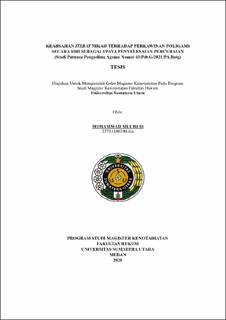Keabsahan Itsbat Nikah Terhadap Perkawinan Poligami Secara Siri Sebagai Upaya Penyelesaian Perceraian (Studi Putusan Pengadilan Agama Nomor 43/Pdt.G/2021/PA.Batg)
The Legal Validity Of Marriage Legalization (Itsbat Nikah) For Unregistered Polygamous Marriages As A Means Of Divorce Resolution

Date
2025Author
Muchlis, Muhammad
Advisor(s)
Purba, Hasim
Barus, Utary Maharany
Metadata
Show full item recordAbstract
Marriage registration serves not only to ensure administrative order but also to protect the rights of the individuals involved in a marriage. The registration of a marriage functions as legal proof that the marriage has lawfully taken place. This study aims to examine and analyze the legal validity of marriage legalization (itsbat nikah) in cases of unregistered polygamous marriages under Indonesian law; to assess its legal standing as a mechanism for protecting the rights of wives in such marriages in the event of divorce; and to analyze the judicial considerations behind the validation of itsbat nikah for unregistered polygamous marriages as a method of resolving divorce cases, based on Religious Court Decision Number 43/Pdt.G/2021/PA.Batg.
This research is a normative juridical study with a descriptive-analytical approach, utilizing secondary data consisting of primary legal materials, secondary legal materials, and tertiary legal materials. Data were collected through library research and field research and analyzed qualitatively.
The findings reveal that the legal validity of itsbat nikah in unregistered polygamous marriages is governed by Article 7 paragraph (3)(a) of the Compilation of Islamic Law, and must fulfill the essential elements and legal requirements of marriage without violating any legal impediments as stipulated in the Marriage Law and the Compilation of Islamic Law. The legal status of itsbat nikah plays a crucial role in providing legal protection for wives in unregistered polygamous marriages in the event of divorce. Once legalized, the marriage attains legal force, enabling the wife to claim her civil rights, including legal identity, alimony, marital property, inheritance, and other entitlements. Judicial considerations for the validity of itsbat nikah in unregistered polygamous marriages-as a means of divorce resolution-require the submission of administrative proof of prior marriages, particularly a marriage certificate, in accordance with Article 7 paragraph (I) of the Compilation of Islamic Law, as this becomes the key determinant in the acceptance or rejection of the itsbat application
Collections
- Master Theses (Notary) [2330]
